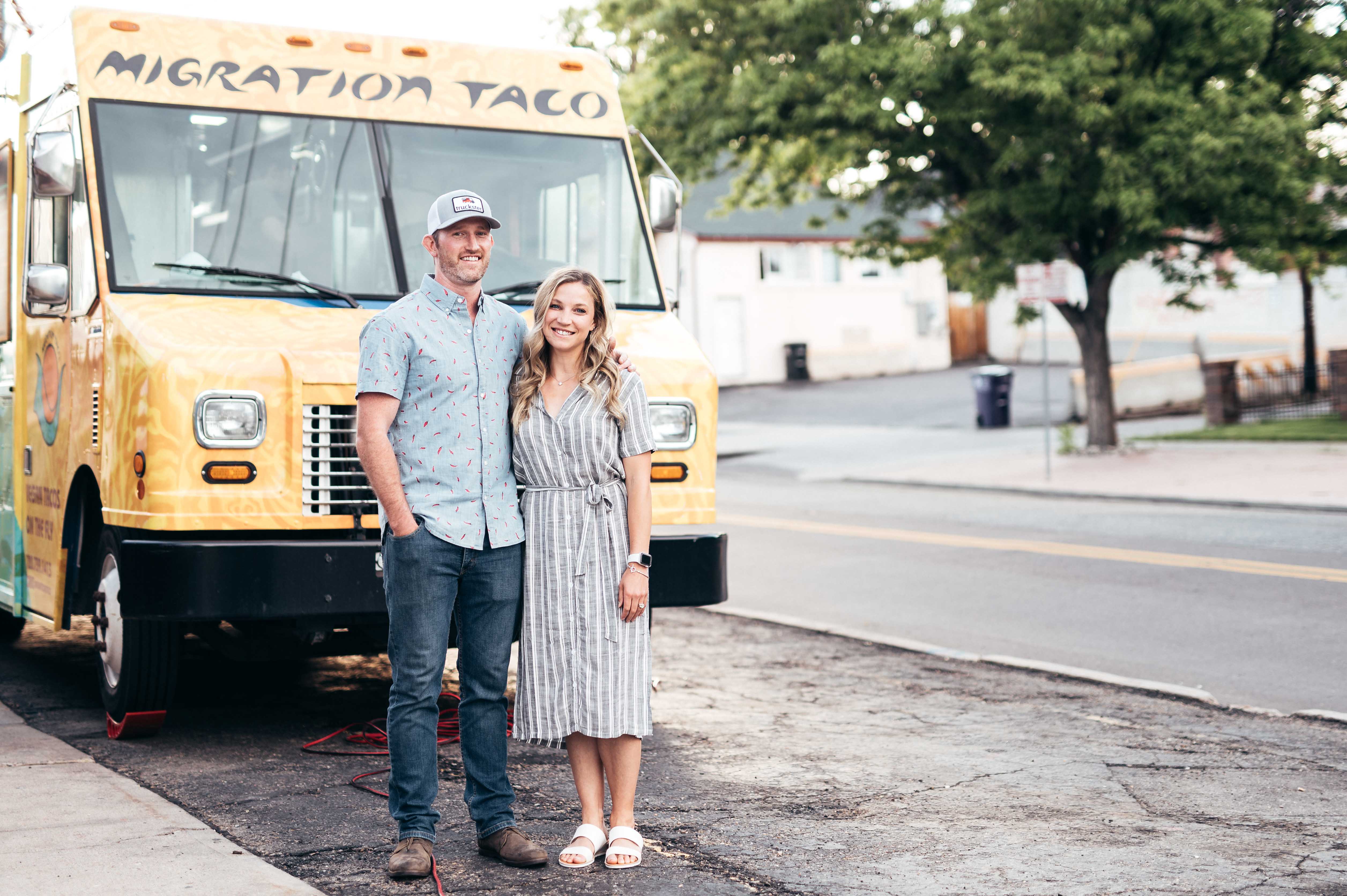Food trucks are a true embodiment of the entrepreneurial spirit at work — a bold assertion of personal style on wheels. Small menus — ranging from refurbished comfort food staples to experimental cuisine in need of smaller-scale testing — seem to get approached with a particularly pioneering spirit when served from a vehicle. In Denver, trucks have been perhaps the most significant bastion of local street food — often setting up shop in droves wherever people congregated. Since assembly has become a public health risk and clustering a crime, trucks have quickly refashioned their business models in order to survive. While the flexibility provided by the small size of most operations has lent some ease in making widespread modifications, truck owners have still been dealing with unique challenges.
As with restaurants, the first concern for truck owners has been developing plans for minimizing interaction and developing standards for safe exchanges. “For the first week, we shut down. I educated myself on the situation and legalities, watched what my colleagues were doing and started to brainstorm,” said The Bamboo Skewer’s Mark English. While specific approaches have varied slightly, businesses have been quick to implement systems that keep both employees and customers protected. Chuey Fu’s Joe Knoblich has opted to go completely cashless — using apps like Square and Truckster — to facilitate transactions, with food-handlers and cashiers remaining separate. Happy Cone’s Mark “Hap” Cameron — who continues to use his regular POS system and payWave — is providing bleach disinfectant between all dealings, as well as setting up a jar with no change provided for any cash transaction.
While previous springs and summers were ripe with a navigable circuit of graduation parties, festivals, packed breweries and private and corporate catering events, truck owners are now faced with empty calendars. “One week in June (2019) we did 14 events in a week,” said Cameron, who was used to running 80 hour weeks from May – September. Since March, individuals have been responsible for drumming up their own business, often calling HOAs or apartment buildings in hopes of feeding people at home. “You can’t rely on all these other things, you have to go out and get your own events. You gotta be a hustler,” said Knoblich. “Smile and dial,” he continued. The Hollowells have done a good job of galvanizing the community, using both the Truckster platform and hundreds of personal calls to housing complexes to connect businesses to viable and receptive customer bases.
While there is no business as usual, the built-in adaptability provided by small staffs and to-go-ready menus has helped some trucks rebound more quickly than others. The Burger Bus’ Jacob Ibarra said business plummeted 75 – 85% the first week following Governor Polis’ initial address, around 50% the following with a near return to normal winter sales by last week.
While Knoblich has been able to keep both his truck and his two brick and mortar locations running, Cameron has thus far consolidated his truck and recently-opened standalone in the Edgewater Public Market into a single operation. Serving a deeply discounted “pandemic pint promo” — four for $20 every Saturday from 10 a.m. to 4 p.m. in the Edgewater parking lot — he hopes to open at full capacity doing curbside service in May.
Some businesses have been supplementing their standard repertoire with creative and timely specials — including Rocky Mountain Slices’ take-home pizza kit and Happy Cones’ Kia Kaha t-shirts that support employee relief. More formalized programs, like Truckster’s #servetheindustry campaign — which gives a dual outlet for aiding struggling businesses and overworked essential employees — have been integral to bolstering the frail industry.
Other trucks have decided to temporarily close their doors. After several harrowing attempts and one successful try at incorporating an online system, city-favorite Yuan Wonton seemed to collapse under the weight of its own popularity.
“It’s been an absolute nightmare trying to transform our business model to accommodate a new ordering system,” said chef and owner Penelope Wong. “Although I feel like we may have figured out a way we could continue with operations with this new ordering system, I truly started to feel as though our business model was becoming unrecognizable to me. I was still fielding a lot of negative feedback from individuals who were not successful in getting orders placed as inventory sold out too fast,” she continued.
With online inventory selling out in less than five minutes, people not adhering to their selected pickup-time and large groups gathering — albeit six feet apart — outside the truck, Wong felt the only responsible thing to do would be shut down. “With what we are trying to deal with, I really felt the need to close down to help promote social isolation and social distancing for the better good of public safety, as well as our own,” she concluded.
During the downtime Wong and her husband and business partner Rob Jenks plan on continuing with their Doctor’s Orders initiative — a donation-based program that has the duo delivering their popular items to hungry hospital workers. As with all things Yuan, the program has been a major success. “The amount of donations that came in far superseded what we had expected. Because of the amount of donations that came in, we are no longer accepting donations for now. We have enough funds to cover costs for approximately 400 meals — we’ve got several hospitals lined up over the next few weeks. Once we get through this first round of donations and if the situation still seems necessary, we’ll put out the option to donate again,” said Wong.

As with other fields, the truck community has banded together, with many owners feeling deep optimism amidst the apprehension. Customer support has helped to sustain morale — Cameron citing the occasional extravagant tip and a gift of some homemade ice cream-print masks as some of the well-considered gestures. “Being able to go out to a truck and order food gives people a sense of normalcy,” said Knoblich.
“Hats off to food trucks for pivoting and being very resourceful,” said Molly Hollowell. “I love what I do. Times are tough right now, but they are for everyone, not just us. We are doing what we can to stay afloat and safely serve our customers until this passes and we can get back to what will hopefully be a better version of normal,” said English. “We’re all in the same boat,” reflected Knoblich.
While most trucks have adjusted or minimized their already haphazard schedules, many are using the extra time to buoy up their social media presence or update their schedules on Truckster.






